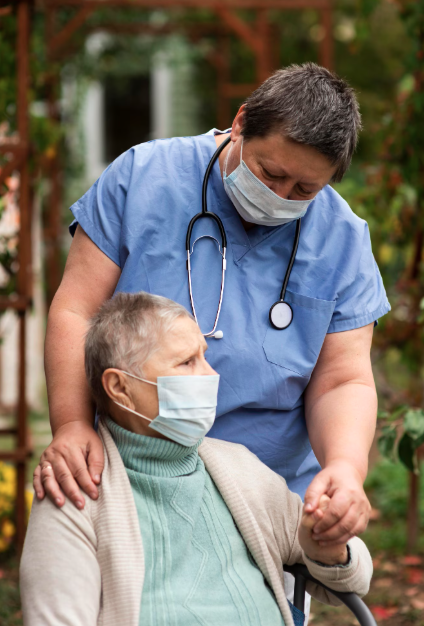Emergencies are unpredictable, and for seniors, even small incidents can turn serious quickly. Professional caregivers are trained to act calmly, assess situations immediately, and provide the right support. Their role in elder care and senior care is not just about routines but being prepared for the unexpected.
1. Rapid Assessment of the Situation
When an emergency occurs, the first few seconds can make a huge difference. Caregivers quickly gauge the situation, understanding the severity and deciding the next steps. “Is this life-threatening or something we can handle right now?” they often ask themselves.
How They Act Fast:
- Check vital signs like breathing, pulse, and consciousness.
- Identify immediate dangers in the environment.
- Decide whether to call 911 or provide first aid.
Quick assessment ensures seniors get timely help without adding confusion or panic.
2. Prioritizing Safety
Safety comes first. Caregivers focus on creating a secure space for the senior, minimizing risks while handling the emergency. “Stay calm, we’re moving to a safer spot,” they might say to reassure a frightened senior.
Safety Steps Taken:
- Move seniors away from slippery floors or sharp objects.
- Ensure walkers, canes, or wheelchairs are within reach.
- Keep pets, visitors, and obstacles out of the immediate area.
This simple focus prevents further injuries and helps maintain control during stressful situations.
3. Administering First Aid and Basic Medical Care
Sometimes, immediate medical attention is necessary before professional help arrives. Caregivers are trained to provide first aid and manage minor injuries effectively.
Emergency First Aid Actions:
- Perform CPR or manage choking situations calmly.
- Treat minor cuts, burns, or bruises efficiently.
- Monitor symptoms while waiting for paramedics.
A caregiver’s knowledge can make a significant difference, ensuring the senior stays stable until help arrives.
4. Staying Calm and Communicating Effectively
In emergencies, panic can spread quickly. Skilled caregivers remain composed and use clear communication to calm seniors. “I’m right here with you; we’ll get through this together,” they often say, giving comfort along with care.
Communication Tactics:
- Speak in a calm, reassuring tone.
- Give step-by-step instructions without overwhelming the senior.
- Keep family members informed to reduce anxiety.
Effective communication helps seniors feel safe and keeps the situation under control.
5. Knowing Emergency Contacts and Procedures
Preparation is key in elder care in East Phoenix. Professional caregivers always have emergency contacts, medical history, and protocols at hand. They know exactly who to call and what information to provide.
Preparedness Steps:
- Maintain an updated list of doctors, hospitals, and family contacts.
- Know the senior’s medical conditions, allergies, and medications.
- Follow pre-planned emergency procedures without hesitation.
Being prepared reduces delays and ensures seniors receive appropriate care immediately.
6. Using Technology and Safety Equipment
Modern senior care relies on technology for quicker responses. Caregivers use medical devices, alarms, and communication tools to handle emergencies efficiently.
Tools in Action:
- Emergency alert systems or wearable health monitors.
- Portable oxygen, first aid kits, and mobility aids.
- Smartphones or tablets to contact family or emergency services instantly.
Technology complements caregiver skills, making elder care safer and more responsive.
7. Emotional Support During Emergencies
Handling emergencies is not just physical; emotional support is crucial. Seniors may feel scared or anxious, and caregivers offer comfort while addressing the situation.
Ways to Provide Comfort:
- Hold their hand or maintain gentle physical contact for reassurance.
- Offer words of encouragement: “You’re safe; we’ve got this.”
- Stay with them throughout until professional help arrives.
Emotional support reduces stress and helps seniors recover from shock faster.
Outcome:
Emergencies test both skills and heart. At Golden Heart Senior Care in Phoenix, AZ, safety is woven into every step, but care goes beyond procedures. Imagine a caregiver who can calm fears, provide first aid, and act decisively—all while making your loved one feel secure. That is the difference we bring. If you want your loved ones protected by trained, compassionate hands, let’s connect today and create a plan that keeps emergencies under control without sacrificing comfort.
FAQs
- How do professional caregivers handle senior emergencies safely?
Professional caregivers assess the situation quickly, ensure safety, provide first aid, communicate calmly, use technology, and offer emotional support to protect seniors during emergencies effectively.
- What first aid skills should a senior caregiver have?
Caregivers should know CPR, choking response, minor wound care, burn management, and vital sign monitoring to stabilize seniors until professional medical help arrives.
- How do caregivers keep seniors calm during emergencies?
They use a reassuring tone, clear instructions, gentle touch, and emotional support, helping seniors feel secure and less anxious while handling unexpected situations.
- Why is preparation important in elder care emergencies?
Preparedness ensures caregivers have medical histories, emergency contacts, and protocols ready, enabling swift action and reducing delays that could worsen the senior’s condition.
- What tools help caregivers manage emergencies faster?
Caregivers use alert systems, wearable health monitors, first aid kits, oxygen equipment, and smartphones to respond quickly and provide effective senior care during crises.
Get in Touch
Golden Heart Senior Care
Phone: 480-284-7360
Website: www.goldenheartscottsdale.com
Address: 8111 E. Thomas Rd Ste. 112 Scottsdale, AZ 85251

